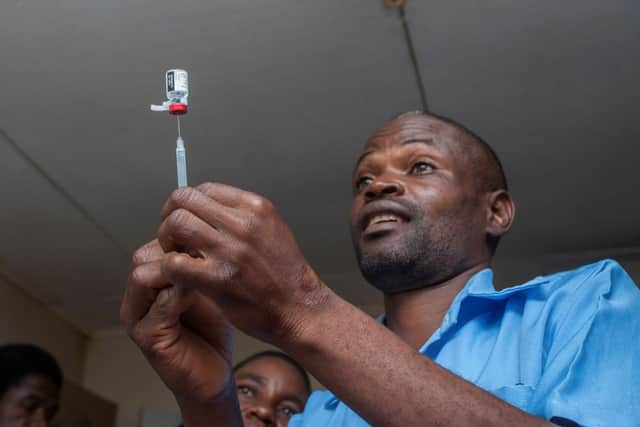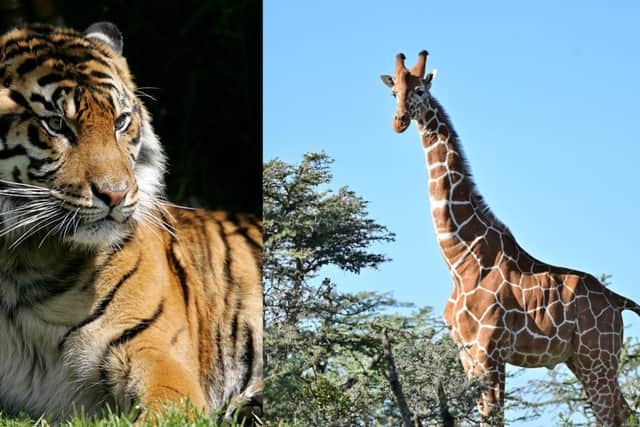Malaria vaccine, the Lionesses & LGBTQ+ rights: the most inspiring stories from 2022
and live on Freeview channel 276
There’s no denying that a lot went wrong in 2022. From Russia’s invasion of Ukraine to the world seeing some of its worst natural disasters on record, the bad news seemed to keep coming. And even after a summer of floods, droughts, and UK political turmoil, when people hoped things might start to calm down, the death of Queen Elizabeth II marked the end of an era, and deadly protests broke out in Iran.
But this isn’t all that happened. Amidst the chaos, environmental disasters, and humanitarian crises, there were some glimmers of good news fighting for attention. We saw breakthroughs in medicine, progress in equal rights, and even a few steps forward when it comes to fighting the climate crisis.
Advertisement
Hide AdAdvertisement
Hide AdSo while it can be easy to focus on the bad, especially in the aftermath of a pandemic and in the midst of a worldwide cost of living crisis, there’s also some room to take notice of the good. With that being said, here are some of the more positive news stories of 2022 to make you feel better about the world.
Malaria vaccine in sight
Scientists at Oxford University have released the results of trials of a new malaria vaccine that is said to have “world-changing” potential. According to the results, the vaccine meets the World Health Organisation 75% efficacy goal, and a deal has already been reached to manufacture 100 million doses a year.
It is hoped that the vaccine will be available by the end of 2023, with charity Malaria No More saying the progress means children dying from malaria could end in our lifetimes.


Alzheimer’s treatment breakthroughs
There were “major steps forward” in finding a cure for Alzheimer’s in 2022, with researchers saying we are heading into a “new era” where successfully treating the disease may be possible.
Advertisement
Hide AdAdvertisement
Hide AdA new drug, Lecanemab, has been shown to slow cognitive decline in patients, particularly when it comes to memory loss. It works by clearing the amyloid protein that builds up in patients’ brains, which is thought to be a key cause of dementia.


Progress in tackling cancer
Also in the field of medicine, scientists developed better tools for detecting cancer this year. These include tests to diagnose cervical cancer and prostate cancer using non-invasive checks, such as blood and urine samples.
There was progress with the use of experimental treatments too. A teenager who had been diagnosed with “incurable” leukaemia was cured thanks to new cell engineering techniques, and a woman who did not think she could make it to Christmas has celebrated a new lease of life after a positive response to an experimental bowel cancer drug.
Research is still ongoing for the new diagnosis and treatment tools, but things are looking increasingly promising.
Some species no longer endangered
Advertisement
Hide AdAdvertisement
Hide AdAlthough the list of endangered species is continuing to grow at an alarming rate, some creatures were removed from major concern in 2022 - proving that extinction predictions can be reversed.
It was announced this year that giraffe populations across Africa have increased by 20% since 2015 - with the number of individual creatures now standing at just over 117,000. Cheetahs returned to India after 70 years thanks to reintroduction programmes, and rhinos returned to Mozambique for the first time in four decades.
In the year of the tiger, Nepal has nearly tripled the creature’s population - recording 355 individual wild tigers, in comparison to 121 in 2009. Meanwhile, the global population of humpback whales rebounded this year after they were nearly wiped out by commercial whaling in the 19th and 20th centuries.
Elsewhere, according to the Wildlife Comeback Report, beavers, bison and pelicans are no longer endangered. This is thanks to a series of reintroduction programmes, with the bison once again roaming England for the first time in thousands of years.


More steps in tackling climate change
Advertisement
Hide AdAdvertisement
Hide AdSome of the world’s biggest players have taken key steps towards tackling climate change in recent months, with one clear indicator of progress being that renewable energy production hit record levels this year.
This has undoubtedly been driven by less positive news - the war in Ukraine - as countries look for alternative energy sources, but it does mean that renewable sources have seen a boost. In fact, according to the International Energy Agency, renewable energy is on track to become the biggest source of global electricity generation by 2025.
There have also been steps forward in protecting forests, something seen by scientists as essential to fighting climate change. Luiz Inacio Lula da Silva’s presidential victory in Brazil was huge news for the Amazon, as he vowed to halt deforestation in the rainforest after it increased sharply under his predecessor Jair Bolsonaro. He said: “We will do whatever it takes to have zero deforestation and the degradation of our biomes”.
Meanwhile, in Europe, EU lawmakers banned the import of products considered to be “drivers of deforestation”. These include palm oil, beef, soy, coffee, and cocoa that was produced on land that was deforested after 31 December, 2020.


LGBTQ+ rights improving
Advertisement
Hide AdAdvertisement
Hide AdDespite the widespread concern over Qatar hosting the 2022 World Cup, considering the country’s record on gay rights, there was still progress for LGBTQ+ people across the globe.
Canada, France, Greece and New Zealand became the most recent countries to officially ban conversion therapy, while Israel and India took their first steps towards outlawing it. Singapore pledged to decriminalise homosexuality, and Antigua and Barbuda decriminalised gay sex.
Same-sex marriage was legalised in Slovenia, making it the 31st country to do so, while Cubans backed same-sex marriage in a referendum. In the US, Congress approved legislation that guaranteed federal recognition of gay marriage. The bill was created out of concern that the Supreme Court could reverse its support for gay marriage, as it did with abortion rights via the overturning of Roe vs Wade.


Gender equality progress in sport
The Women’s Euros shined a spotlight back on women’s sport, with the final between England and Germany breaking the record for the most attended match at any European Championship and generating the largest TV audience for a women’s match in history.
Advertisement
Hide AdAdvertisement
Hide AdAlso in football, the men’s World Cup celebrated a milestone when for the first time ever, a female referee officiated a match, and in the US, the Soccer Federation announced it had reached a deal guaranteeing equal pay for its men’s and women’s national teams.
If you’re looking for more positive news stories, visit this page on our website. There, you can read about a teenage girl who inspired Disney’s first hero with glasses, and a nine-year-old brain tumour patient who wrote a book about positivity and kindness.
Comment Guidelines
National World encourages reader discussion on our stories. User feedback, insights and back-and-forth exchanges add a rich layer of context to reporting. Please review our Community Guidelines before commenting.
